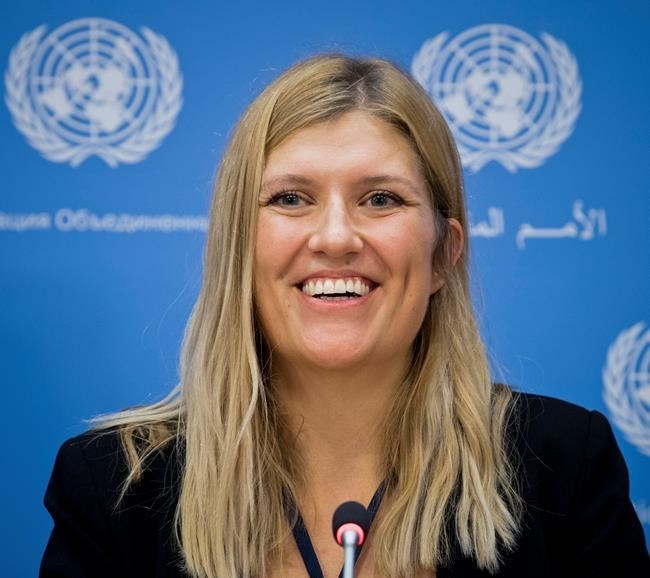Edith M. Lederer

Beatrice Fihn, executive director of the International Campaign to Abolish Nuclear Weapons (ICAN), speaks during a press conference, Monday Oct. 9, 2017 at United Nations headquarters. ICAN, a coalition of non-government organizations in one hundred countries advocating a nuclear weapon ban treaty, is the 2017 winner of the Nobel Peace Prize. (Eskinder Debebe/United Nations via AP)
Republished October 09, 2017 - 8:58 PM
Original Publication Date October 09, 2017 - 7:26 PM
The head of the anti-nuclear campaign that won this year's Nobel Peace Prize said Monday its goal is to make nuclear weapons unacceptable in the minds of people in every country — and have all nuclear-armed nations listen to their citizens and give up their arsenals.
Beatrice Fihn, executive director of the International Campaign to Abolish Nuclear Weapons known as ICAN, told a news conference that for a long time nuclear weapons have been seen as "an issue of the past" that isn't relevant.
But she said a potential nuclear arms race with nuclear nations modernizing their weapons and threats by U.S. President Donald Trump and North Korea's leader Kim Jong Un to use nuclear weapons "makes this an urgent issue again."
"I think that this Nobel Peace Prize can really bring about a much bigger movement against nuclear weapons," Fihn said. "This gives us an enormous opportunity to reach out to new audiences, and to mobilize people once again."
ICAN, currently a coalition of 468 organizations in 101 countries, is expecting to expand.
Ray Acheson, an ICAN steering committee member from the Women's International League for Peace and Freedom, told reporters that since the Nobel prize announcement on Friday the campaign has received "a lot of new partnership requests."
The Nobel committee cited Geneva-based ICAN for its work that led to the first-ever Treaty on the Prohibition of Nuclear Weapons that was agreed to by 122 countries at the United Nations in July. It opened for signature on Sept. 20 and already 53 countries have signed and three have ratified.
Fihn said ICAN's "ambitious goal" is to get the 50 ratifications needed for the treaty to enter into force before the end of 2018.
The United States, which boycotted negotiations along with other nuclear powers, reacted to ICAN's award saying the treaty "will not make the world more peaceful, will not result in the elimination of a single nuclear weapon, and will not enhance any state's security."
Fihn said the U.S. reaction was "quite expected," but it shows the treaty is having "an impact on them."
She stressed, however, that the Nobel Peace Prize isn't going to make Trump give up nuclear weapons.
"But I don't think that's really what we're doing here," she said. "What we're trying to do here is to make nuclear weapons unacceptable in the minds of the people, and that's where civil society has the power. That's really what is changing things. And in the end, governments have to do what their people say."
As for North Korea, Fihn said, North Korea won't disarm as long as it thinks nuclear weapons are acceptable, legitimate and justified.
The nuclear weapon states and those countries under their nuclear umbrella currently maintain they are necessary for security, she said.
"I think that is what this treaty is about — stop allowing them to justify having weapons of mass destruction that are only meant to indiscriminately slaughter hundreds of thousands of civilians," Fihn said.
She said it's been during previous times of big crises that "the most progress" has been made toward nuclear disarmament.
Five years after the Cuban missile crisis in 1962, the Treaty of Tlatelolco was signed prohibiting nuclear weapons in Latin America and the Caribbean, and later the Nuclear Nonproliferation Treaty, she said. And during heightened Cold War tensions talks in Reykjavik, Iceland between then U.S. president Ronald Reagan and Soviet leader Mikhail Gorbachev in 1986 resulted in the treaty to eliminate intermediate and shorter-range nuclear and conventional missiles the following year.
Fihn said these crises, and the current escalating U.S.-North Korean tensions, "also bring about public mobilization."
"I think that that's where this peace prize is extremely timely, and very urgently needed attention on this issue," she said.
News from © The Associated Press, 2017